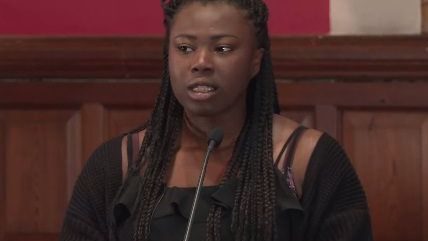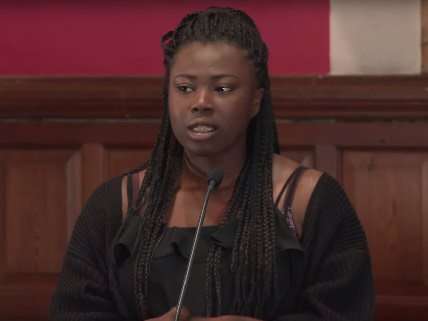Why We Should Pity the Anti-Rape Activist Who Convinced Herself She's a Rapist.
Affirmative consent will never work as policy


An Oxford University student has resigned from her various activist commitments after confessing to nonconsensual sex in an emotional personal statement. The internet, unsurprisingly, is having a laugh at her expense: who can resist the comedy of the far-left hypocrite?
But in truth, we should pity this woman, even if she is ultimately a victim of her own crazy consent policies. That's because affirmative consent, properly understood, is impossible—and it's going to turn a lot of innocent people into incidental rapists.
Annie Teriba was the editor of a publication for gay and trans writers and a racial equality officer of a student government group. She is stepping down from these positions, however, due to sexual transgressions. According to Teriba's statement:
At this year's NUS Black Students' Conference, I had sex with someone. The other party later informed me that the sex was not consensual. I failed to properly establish consent before every act. I apologise sincerely and profoundly for my actions. I should have taken sufficient steps to ensure that everything I did was consensual. I should have been more attentive to the person's body language. In failing to clarify that the person consented to our entire encounter, I have caused serious irreparable harm.
In a separate incident, in my first year of university, I was alerted to my inappropriate behaviour whilst drunk in a club, where I had touched somebody in a sexual manner without their consent. Therefore this is not an isolated incident. I apologise sincerely and profoundly for my actions.
With these incidents I have rightly lost the trust of those who I organise with and fully intend to work to ensure that I both put my politics into practice in my personal relations and to prove to them that I am committed to transformation. As such, it would be wrong of me to accept platforms and access spaces until I have done so. …
I breached NUS's safe spaces policy, so will not be attending future NUS events.
Emphasis mine. It seems clear that the first incident is a violation of an affirmative consent "Yes Means Yes" standard, which requires participants in a sexual encounter to agree to each sexual activity prior to engaging in those things. The fact that Teriba's partner gave no indication he or she objected to the sex act until afterward doesn't matter; under affirmative consent, sex is nonconsensual unless all aspects of it are vigorously agreed upon beforehand. In this light, Teriba's evaluation of her actions is correct: her sex was nonconsensual. Call it sexual assault, call it rape, call it whatever you like—under the standard preferred by activists, many college administrators, and the state of California, it's not okay.
Well, a whole lot of people are going to find themselves in Teriba's situation if Yes Means Yes continues to spread, because affirmative consent—to the extent that it requires verbal confirmation of individual sex acts—is virtually impossible. As even many activists admit, almost no one has sex like this. No one seeks permission to hold a hand, to touch a shoulder, to give a kiss, to supply tongue, and on and on. But even if affirmative consent ushers in a new era of sexual consent norms—something its adherents desperately want—no one will be able to meet its requirements. It's impossible to reduce sex to a series of distinct acts, each of which comes with its own check box. Communicating general consent for broadly separate activities is doable; distilling every conceivable combination of touching body parts into individual items and requiring obvious, inarguable pre-existing agreement is not. No one will be able to prove this threshold was met if a partner challenges it later.
That's according to the strictest version of affirmative consent. A less rigorous definition holds that "nonverbal cues" can satisfy the requirements in lieu of verbal agreement. But a nonverbal cue is much less precise than a verbal agreement. Who gets to say what counts? Is "failing to resist" a nonverbal method of giving consent? If it is, Yes Means Yes is actually the same thing as "No Means No." If it isn't, then why isn't it? Who decides? How will anyone sort this out if a dispute arises?
In a recent story for The New York Times, reporter Jennifer Medina used a high school lesson in affirmative consent as a vehicle to explore these problems. California now requires high school students to be trained in affirmative consent—a standard they aren't actually held to until and unless they have sex on a college campus. According to the story:
Today, the 15-year-olds gathered around tables to discuss another topic: how and why to make sure each step in a sexual encounter is met with consent.
Consent from the person you are kissing — or more — is not merely silence or a lack of protest, Shafia Zaloom, a health educator at the Urban School of San Francisco , told the students. They listened with rapt attention, but several did not disguise how puzzled they felt.
"What does that mean — you have to say 'yes' every 10 minutes?" asked Aiden Ryan, 15, who sat near the front of the room.
"Pretty much," Ms. Zaloom answered. "It's not a timing thing, but whoever initiates things to another level has to ask."
A sex policy that requires a fresh barrages of 'yesses' every few minutes can never work as the standard by which we judge whether an encounter constitutes rape, unless the goal is to retroactively turn everyone into rapists.
One last note about Teriba: feminist students at Oxford have denounced her as a rape apologist. If she had not resigned, she would have been fired from her groups. The student government "would never allow a known perpetrator of sexual violence to hold power on the committee," said Student Union President Taisie Tsikas.


Show Comments (333)